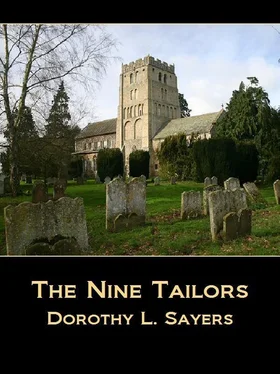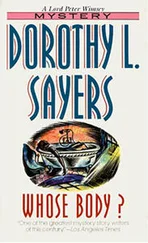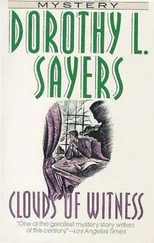Dorothy Sayers - The Nine Tailors
Здесь есть возможность читать онлайн «Dorothy Sayers - The Nine Tailors» весь текст электронной книги совершенно бесплатно (целиком полную версию без сокращений). В некоторых случаях можно слушать аудио, скачать через торрент в формате fb2 и присутствует краткое содержание. Жанр: Классический детектив, на английском языке. Описание произведения, (предисловие) а так же отзывы посетителей доступны на портале библиотеки ЛибКат.
- Название:The Nine Tailors
- Автор:
- Жанр:
- Год:неизвестен
- ISBN:нет данных
- Рейтинг книги:3 / 5. Голосов: 1
-
Избранное:Добавить в избранное
- Отзывы:
-
Ваша оценка:
- 60
- 1
- 2
- 3
- 4
- 5
The Nine Tailors: краткое содержание, описание и аннотация
Предлагаем к чтению аннотацию, описание, краткое содержание или предисловие (зависит от того, что написал сам автор книги «The Nine Tailors»). Если вы не нашли необходимую информацию о книге — напишите в комментариях, мы постараемся отыскать её.
The Nine Tailors — читать онлайн бесплатно полную книгу (весь текст) целиком
Ниже представлен текст книги, разбитый по страницам. Система сохранения места последней прочитанной страницы, позволяет с удобством читать онлайн бесплатно книгу «The Nine Tailors», без необходимости каждый раз заново искать на чём Вы остановились. Поставьте закладку, и сможете в любой момент перейти на страницу, на которой закончили чтение.
Интервал:
Закладка:
“That’s what Uncle calls my unfeminine lack of tact. He says it comes of going to school and playing hockey.”
“He may be right. But why worry?”
“I’m not worrying — only, you see. Uncle Edward will have to look after me now, and he thinks it’s all wrong for me to be going to Oxford…. What are you looking at? The distance from the South gateway?”
“Uncomfortably discerning woman — yes, I was. You could bring the body in a car and carry it round without too much difficulty. What’s that, there, close up by the north wall of the churchyard? A well?”
“Yes; that’s the well where Gotobed gets the water for washing out the porch and scrubbing the chancel and all that. I think it’s rather deep. There used to be a pump there at one time, but the village people used to come and use it for drinking water, when the village well ran dry, and Mr. Venables had to stop it, because he said it wasn’t sanitary, drinking water out of a graveyard; so he took the pump away, and paid for having the village well dug deeper and put in order. He’s a frightfully good old sort. When Gotobed wants water he has to haul it up as best he can in a bucket. He grumbles a lot about it. The well’s a great nuisance, anyway, because it makes the graves on that side very damp, and sometimes in the winter you can’t die them properly. It was worse before Mr. Venables had the churchyard drained.”
“Mr. Venables seems to do a lot for the parish.”
“He does. Dad used to subscribe to things, of course, but Mr. Venables generally starts things, when it’s anything to do with the Church. At least, when it’s things like drains, it’s probably Mrs. Venables. Why did you want to know about the well?”
“I wanted to know whether it was used or disused. As it’s used, of course nobody would think of hiding anything large in it.”
“Oh, you mean the body? No, that wouldn’t have done.”
“All the same,” said Wimsey… “Look here! forgive my asking, but, supposing your father hadn’t died when he did, what sort of tombstone would he have been likely to put up to your mother? Any idea?”
“None at all. He hated tombstones and wouldn’t discuss them, poor darling. It’s horrid to think that he’s got to have one.”
“Quite. So that for all anybody knew, he might have had a flat stone put down, or one of those things with a marble kerb round and chips in the middle.”
“A thing like a fender? Oh, no! he’d never have had that. And certainly not chips. They always reminded him of that fearfully genteel kind of coffee-sugar you get at the sort of places where everything’s served on mats and all the wine-glasses are coloured.”
“Ah! but did the murderer know your father’s feelings about coffee-sugar and wine-glasses?”
“Sorry — I don’t know what you’re driving at.”
My fault; I’m always so incoherent. I mean — when there are such lots of good places for putting bodies in — dykes and drains and so on, why cart one at great risk and trouble to a churchyard to plant it where it might quite easily be dug up by a stonemason smoothing away the earth for a fenderful of marble chips? I know the body was a good two feet below ground-level, but I suppose they have to dig down a bit when they set up gravestones. It all seems so odd and so rash. And yet, of course, I can see the fascination of the idea. You’d think a grave was about the last place where anyone would look for a stray body. It was sheer bad luck that it should have had to be opened up again so soon. All the same — when you think of the job of getting it here, and digging away at night in secret—! But it looks as though it must have been done that way, because of the rope-marks, which show that the man was tied up somewhere first. It must, I mean, all have been deliberate and thought-out beforehand.”
“Then the murderer couldn’t have thought about it earlier than New Year’s Day when Mother died. I mean, he couldn’t have counted on having a grave handy.”
“Of course he couldn’t; but it may have happened at any time since.”
“Surely not at any time. Only within a week or so after Mother died.”
“Why?” asked Wimsey, quickly.
“Why, because old Gotobed would be certain to notice if anybody had been digging his grave about after the earth had been firmed up properly. Don’t you think it must have happened quite soon — probably while the wreaths were still on the grave? They stayed there for a week, and then they looked dead and beastly, and I told Gotobed to chuck them away.”
“That’s an idea,” said Wimsey. “I never thought about that — not having had very much to do with the digging of graves. I must ask Gotobed about it. I say! Can you remember how long the snow lay after your mother died?”
“Let me see. It stopped snowing on New Year’s Day, and they swept the path up to the south door. But it didn’t start to thaw till — wait! I know! It was during the night of the second, though it had been getting sort of warmer for two days, and the snow was kind of damp. I remember quite well now. They dug the grave on the third, and everything as all sloshy. And on the day of the funeral it rained like billy-oh! It was dreadful. I don’t think I shall ever forget it.”
“And that took all the snow away, of course.”
“Oh, yes.”
“So it would have been easy enough for anybody to get to the grave without leaving footprints. Yes. I suppose you never noticed yourself that the wreaths had been moved, or anything?”
“Oh, no! As a matter of fact, I didn’t come here much. Dad was so ill, I had to be with him — and anyway, I didn’t think of Mother as being here, you know. Lord Peter, I think all this business about graves is hateful, don’t you? But I’ll tell you who would have noticed anything, and that’s Mrs. Gates — our housekeeper, you know. She came down every day. She’s a perfect ghoul. She kept on trying to talk to me about it, and I wouldn’t listen to her. She’s quite nice, really, but she ought to live in a Victorian novel, where people wear crêpe and weep into the tea-cups…. Oh, dear! there’s Uncle Edward looking for me. He looks quite dyspeptic with disapproval. I’m going to introduce you to him, just to embarrass the poor dear…. Uncle Edward! This is Lord Peter Wimsey. He’s been so kind. He says I have a creative imagination, and ought to be a writer.”
“Ah! how do you do?” Mr. Edward Thorpe, forty-four, very correct and formal, presented a bland Civil-Service front to the impact of Wimsey’s personality. “I believe I have met your brother, the Duke of Denver. I hope he is quite well… Quite… quite so…. It is very good of you to take an interest in my niece’s young ambitions. All these young women mean to do great things, don’t they? But I tell her, authorship is a good stick, but a bad crutch. Very distressing business, this. I am so sorry she should be dragged into it, but of course, in her position, the village people expect her to — ah! — enter into their — ah! — their — um—”
“Amusements?” suggested Wimsey. It came upon him with a shock that Uncle Edward could not be many years older than himself. He felt for him the apprehensive reverence which one feels for a quaint and brittle piece of antiquity.
“For anything which touches them nearly,” said Mr. Thorpe. Gallant fellow! Deeply disapproving, he yet sought to defend his niece against criticism. “But I am taking her away for a little peace and quietness,” he added. “Her aunt, unhappily, was unable to come to Fenchurch — she suffers sadly from rheumatoid arthritis — but she is looking forward to seeing Hilary at home.”
Wimsey, glancing at Hilary’s sullen face, saw rebellion rising; he knew exactly the kind of woman who would have married Uncle Edward. “In fact,” said Mr. Thorpe, “we are leaving tomorrow. I am so sorry we cannot ask you to dine, but under the circumstances—”
Читать дальшеИнтервал:
Закладка:
Похожие книги на «The Nine Tailors»
Представляем Вашему вниманию похожие книги на «The Nine Tailors» списком для выбора. Мы отобрали схожую по названию и смыслу литературу в надежде предоставить читателям больше вариантов отыскать новые, интересные, ещё непрочитанные произведения.
Обсуждение, отзывы о книге «The Nine Tailors» и просто собственные мнения читателей. Оставьте ваши комментарии, напишите, что Вы думаете о произведении, его смысле или главных героях. Укажите что конкретно понравилось, а что нет, и почему Вы так считаете.












